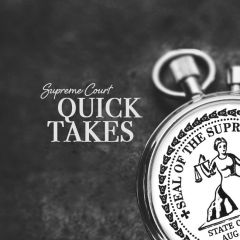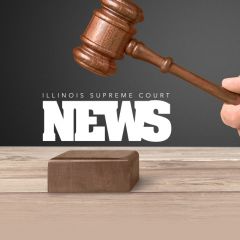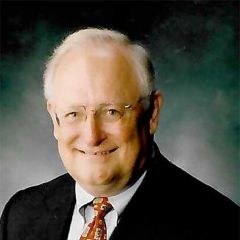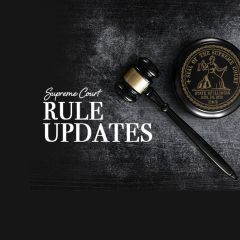Join us online from 10 until 11 a.m. on Wednesday, September 23 to learn what documentation is needed for your client to get paid on their construction project. Topics include the importance of sworn owner’s and contractor’s statements, lien waivers, and construction disbursing escrow; Illinois’ proper payment system and the documentation required to limit the owner’s exposure; the reasons for needing additional information by title companies; and what a contractor and subcontractor need to provide in order to get paid.
ISBA members, sign up to receive The Bar News' biweekly e-newsletter by emailing emailpreferences@isba.org
-
August 24, 2020 | CLE

-
August 24, 2020 | Practice News
 Zoom has become the prevalent videoconferencing platform of the pandemic era. But there are other high-quality options, says Affinity Consulting’s Jeffrey R. Schoenberger in his Practice HQ column in the August Illinois Bar Journal. In the column, “Weaving a Virtual Presence: Web Meetings,” Schoenberger highlights the differences between Zoom, Microsoft Teams, Google Meet, and GoToMeeting. He also points out their respective features and benefits. Maybe you like what you’re using. But perhaps you’ve been too busy to try anything else. Heading into autumn, now is the time to explore other options and see what works best.
Zoom has become the prevalent videoconferencing platform of the pandemic era. But there are other high-quality options, says Affinity Consulting’s Jeffrey R. Schoenberger in his Practice HQ column in the August Illinois Bar Journal. In the column, “Weaving a Virtual Presence: Web Meetings,” Schoenberger highlights the differences between Zoom, Microsoft Teams, Google Meet, and GoToMeeting. He also points out their respective features and benefits. Maybe you like what you’re using. But perhaps you’ve been too busy to try anything else. Heading into autumn, now is the time to explore other options and see what works best. -
August 20, 2020 | Practice News
 The Illinois Supreme Court handed down one opinion on Thursday, August 20. In People v. Sophanavong, the court considered whether a circuit court’s failure to strictly comply with the requirements to proceed without a presentence investigation report requires remand for a new sentencing hearing or whether a defendant can waive the issue by pleading guilty as well as forfeit the claim by failing to raise it in a postplea motion. People v. Sophanavong
The Illinois Supreme Court handed down one opinion on Thursday, August 20. In People v. Sophanavong, the court considered whether a circuit court’s failure to strictly comply with the requirements to proceed without a presentence investigation report requires remand for a new sentencing hearing or whether a defendant can waive the issue by pleading guilty as well as forfeit the claim by failing to raise it in a postplea motion. People v. Sophanavong -
August 19, 2020 |
ISBA News
The ISBA is seeking input from attorneys whose practices include rural areas and small towns in Illinois. Many areas of Illinois outside of urban areas are experiencing a shortage of attorneys to meet the needs of their residents. Experienced practitioners have sometimes struggled to connect with newer attorneys to expand or transition their practices.
-
August 18, 2020 |
Practice News
Colleen Boraca, Clinical Associate Professor, Northern Illinois University College of Law March 10, 2020 was a fairly normal day. Although it was spring break, two law students were working with me at the NIU Health Advocacy Clinic, a law-school based legal clinic that is located onsite in Aurora at Hesed House, the second largest homeless shelter in Illinois. In the morning, one of the students interviewed a potential client, “Jane,” who was looking for representation with her Social Security case. After the meeting, the students and I debriefed about they handled their interview with Jane and brainstormed areas for improvement. After that session, the students worked on PowerPoint slides for an upcoming presentation on SNAP benefits. We saw Jane again while serving lunch at Hesed House that day, and she told us that she would see us next week. The students left clinic that day, enthused to work on Jane’s case and hopefully change her life if they could secure disability benefits for her.
-
August 18, 2020 | Practice News
 Starting September 1, self-represented litigants in Illinois can submit a question online about their civil appeal and receive an answer from a pro bono lawyer with the launch of Illinois Free Legal Answers for Civil Appeals, the first-ever legal help desk for appeals in Illinois. The program was created to address the pressing need to provide help to self-represented litigants (SRLs), who account for 41% of civil appeals filed in the state.
Starting September 1, self-represented litigants in Illinois can submit a question online about their civil appeal and receive an answer from a pro bono lawyer with the launch of Illinois Free Legal Answers for Civil Appeals, the first-ever legal help desk for appeals in Illinois. The program was created to address the pressing need to provide help to self-represented litigants (SRLs), who account for 41% of civil appeals filed in the state. -
August 18, 2020 | CLE
 Join us online from noon until 1:30 p.m. on Tuesday, September 29 for "Decisions and Diversity–How Our Minds and Experiences Sustain Bias and What to Do About It." Making decisions is at the core of what lawyers do, yet we are often unaware of the ways that our brains, personalities, life experiences, and social structures affect our decision-making choices, often in the form of implicit biases, preferences, assumptions, and expectations that impede fostering a diverse and inclusive legal profession. Join us for this in-depth look at how we come to think about others, make judgement of people and situations, and otherwise think and behave in ways that are potentially influenced by bias. Designed with the transactional attorney in mind, this program discusses our interactions with clients, colleagues, and others in the legal profession, while also offering helpful strategies for addressing and preventing the undue influence of bias both in and out of the workplace.
Join us online from noon until 1:30 p.m. on Tuesday, September 29 for "Decisions and Diversity–How Our Minds and Experiences Sustain Bias and What to Do About It." Making decisions is at the core of what lawyers do, yet we are often unaware of the ways that our brains, personalities, life experiences, and social structures affect our decision-making choices, often in the form of implicit biases, preferences, assumptions, and expectations that impede fostering a diverse and inclusive legal profession. Join us for this in-depth look at how we come to think about others, make judgement of people and situations, and otherwise think and behave in ways that are potentially influenced by bias. Designed with the transactional attorney in mind, this program discusses our interactions with clients, colleagues, and others in the legal profession, while also offering helpful strategies for addressing and preventing the undue influence of bias both in and out of the workplace. -
August 17, 2020 | Practice News
 In their August 2020 article, “Discovery Wars,” Madhavi K. Seth and Vikram S. Arora explore Illinois and federal professional and procedural rules when preparing a client’s employees as knowledgeable witnesses and contacting the adverse party’s employees for evidence. Being aware of the sanctions that attorneys may face for not meeting their obligations under the rules is important, Seth and Arora argue, not least because, in discovery, litigators can find themselves walking a fine line between zealous advocacy and ethical pitfalls. Modern American jurisprudence has led many attorneys to seek guidance on their obligations under Illinois procedural and professional conduct rules when preparing their client’s employees as witnesses and contacting an adverse party’s former or current employees during discovery.
In their August 2020 article, “Discovery Wars,” Madhavi K. Seth and Vikram S. Arora explore Illinois and federal professional and procedural rules when preparing a client’s employees as knowledgeable witnesses and contacting the adverse party’s employees for evidence. Being aware of the sanctions that attorneys may face for not meeting their obligations under the rules is important, Seth and Arora argue, not least because, in discovery, litigators can find themselves walking a fine line between zealous advocacy and ethical pitfalls. Modern American jurisprudence has led many attorneys to seek guidance on their obligations under Illinois procedural and professional conduct rules when preparing their client’s employees as witnesses and contacting an adverse party’s former or current employees during discovery. -
August 17, 2020 | People
 John T. Phipps, 82, of Champaign, passed away on Aug. 11, 2020, after spending his final days surrounded by his family and friends. John was born on Sept. 20, 1937, to Oliver and Jean Phipps. He is survived by his wife, Dody Phipps; his sister, Louise McWhinnie (Jim); his three children, Anne Martinkus (Jim), John Phipps (Becky), and Karen Dorner (David); and his grandchildren, Chase Martinkus, Miranda Phipps, Carter Phipps, Connor Dorner and Emma Dorner.1 comment (Most recent August 20, 2020)
John T. Phipps, 82, of Champaign, passed away on Aug. 11, 2020, after spending his final days surrounded by his family and friends. John was born on Sept. 20, 1937, to Oliver and Jean Phipps. He is survived by his wife, Dody Phipps; his sister, Louise McWhinnie (Jim); his three children, Anne Martinkus (Jim), John Phipps (Becky), and Karen Dorner (David); and his grandchildren, Chase Martinkus, Miranda Phipps, Carter Phipps, Connor Dorner and Emma Dorner.1 comment (Most recent August 20, 2020) -
August 14, 2020 | Practice News
 Chief Justice Anne M. Burke and the Illinois Supreme Court announced today the amendment of Rule 9(c)(5), which will allow self-represented litigants (SRLs) who are unable to complete the e-filing process on their own and unable to get e-filing assistance from the court to file by mail, in person, or other means . The amended rule is effective immediately. "The Illinois Courts continue to adapt to issues brought on by this pandemic," Chief Justice Burke said. "This change provides self-represented litigants greater flexibility and efficiency when physical access to courthouses is limited by COVID-19."
Chief Justice Anne M. Burke and the Illinois Supreme Court announced today the amendment of Rule 9(c)(5), which will allow self-represented litigants (SRLs) who are unable to complete the e-filing process on their own and unable to get e-filing assistance from the court to file by mail, in person, or other means . The amended rule is effective immediately. "The Illinois Courts continue to adapt to issues brought on by this pandemic," Chief Justice Burke said. "This change provides self-represented litigants greater flexibility and efficiency when physical access to courthouses is limited by COVID-19."

